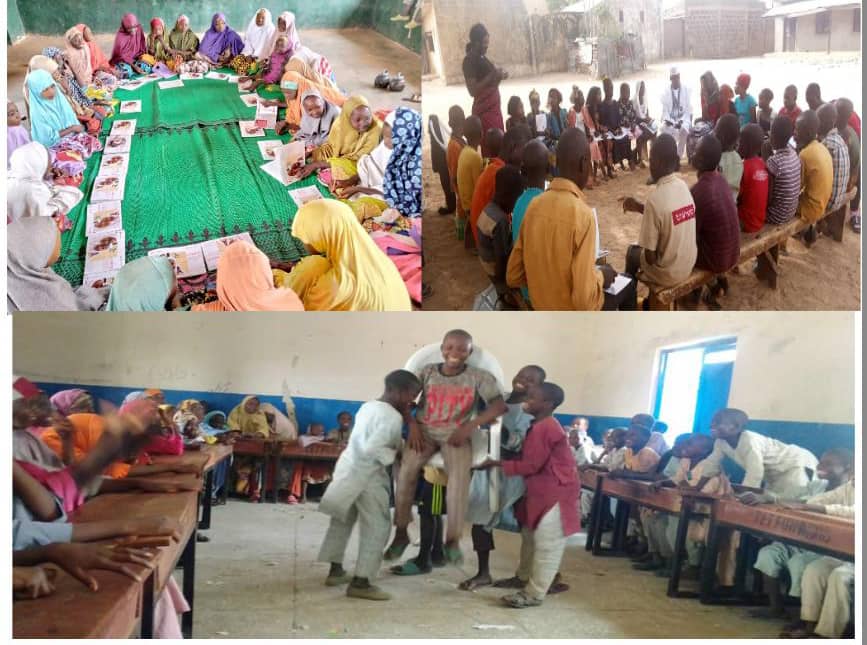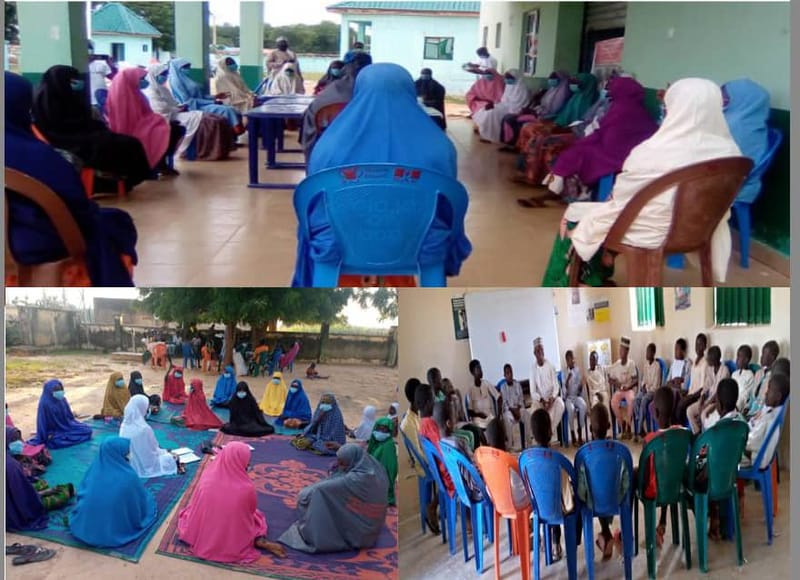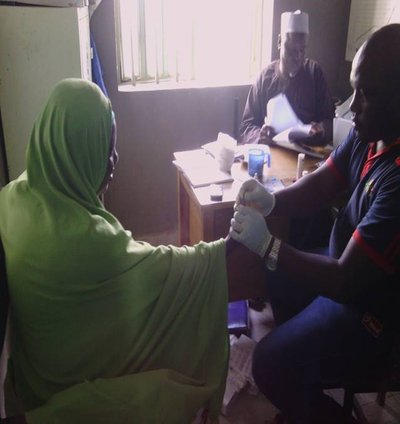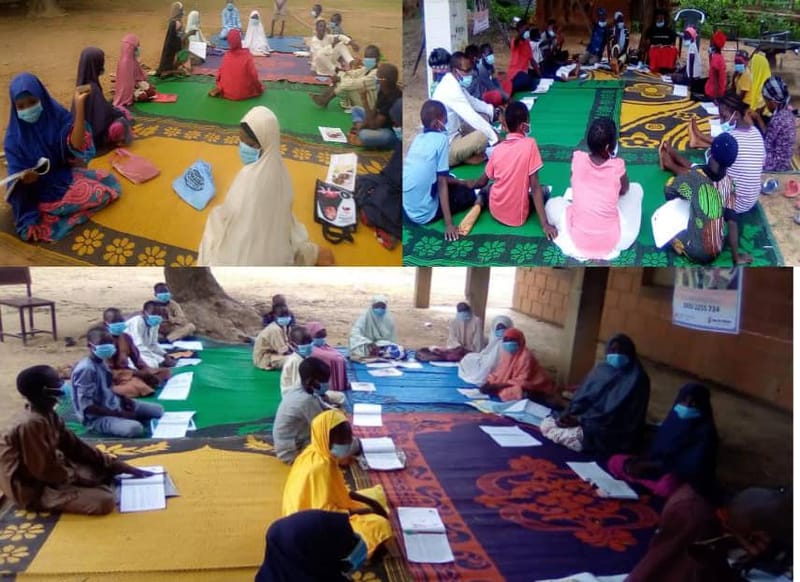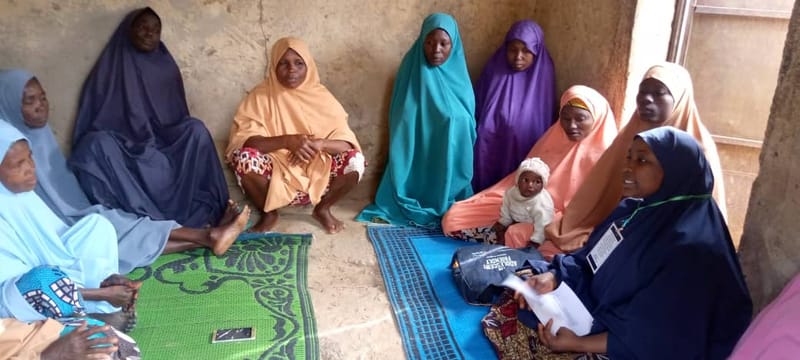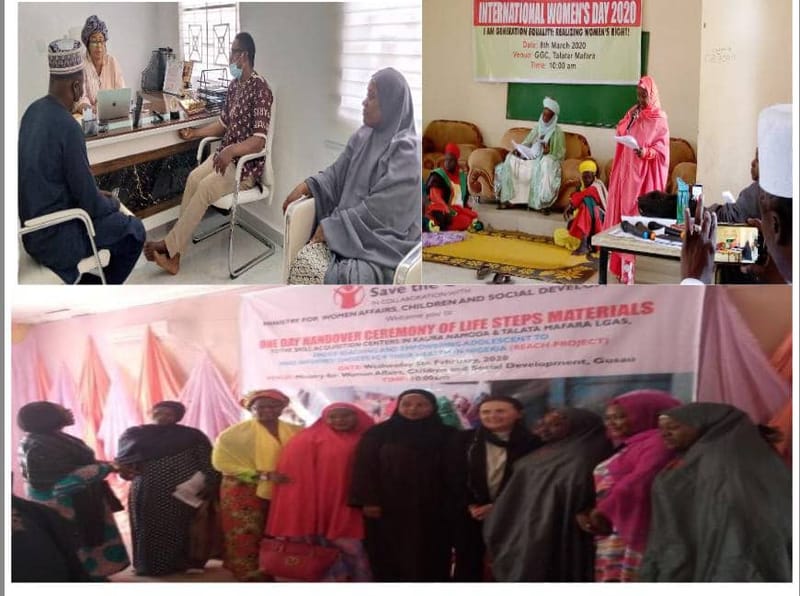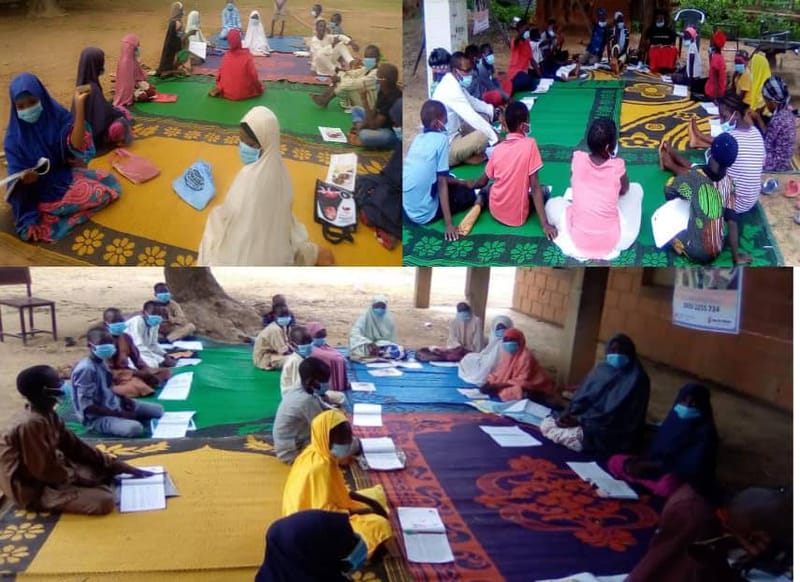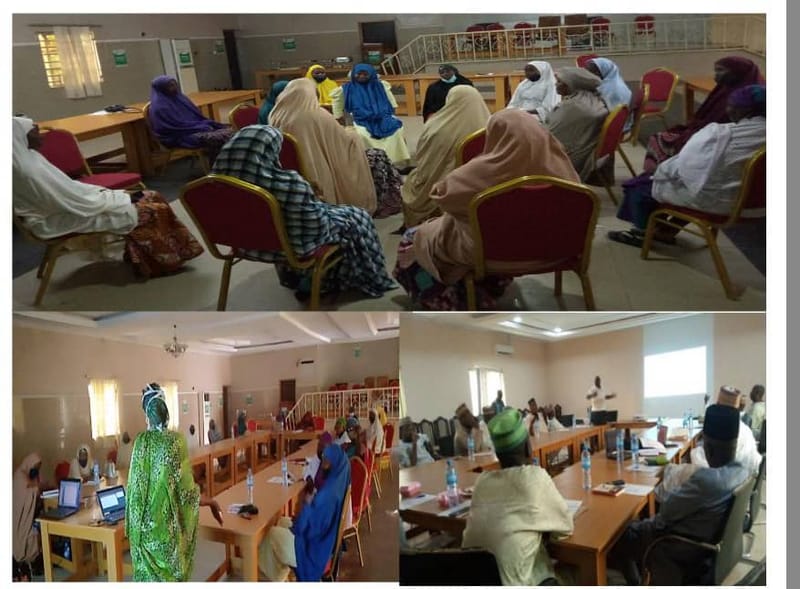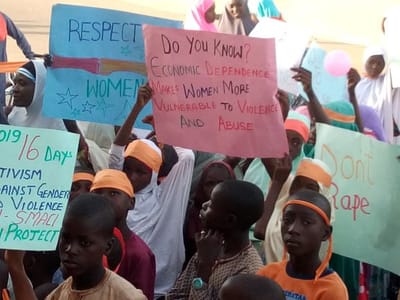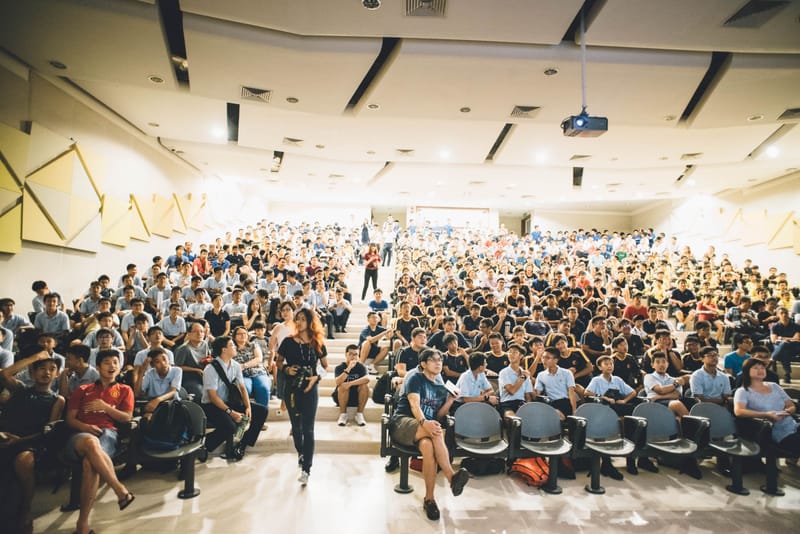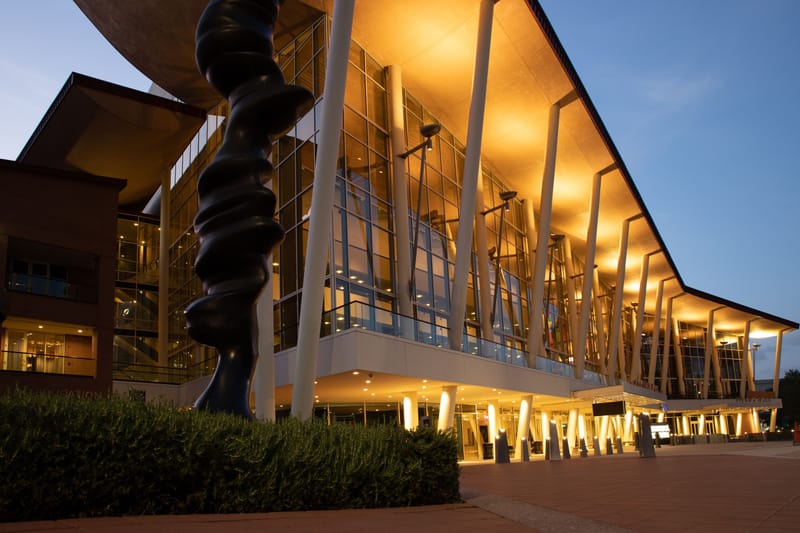Our donors and Partners - Global Affairs Canada
- Save the Children International
- Chemonics International
- World Bank, NACA, SACA and LACA
- World Health Organization
- Former PRRINN MNCH
- UNICEF
- Zamfara State MDAs
- Global Affairs Canada GAC and Save the Children International SCI
We are sincerely appreciating the Global Affairs Canada (GAC) for their Grant through Save the Children International (SCI) with their Grant, we are able to accomplish the goal of improved sexual and reproductive health of 100,000 adolescent girls and boys (aged 10-19) in Gombe, Katsina and Zamfara states in Nigeria and achieved in the following result:Successfully completed and delivered the Choices, ASRH and life skills curriculum. 122,863 Adolescent in 3 state
Increase confidence of adolescent girls in delaying marriage till the age of 18 form 69% to 85%.
Reduced early child marriage before the age of 15 from 41% to 54%.
Increased the knowledge of adolescent girls for the importance of pregnancy safe spacing from 51% to 82%.
Increase willingness of couple on joint decision making about SRH from 35% to 64%.
Enrolled and retained 703 adolescents into school, 467 Girls and 236 boys.
Thank you GAC for giving the Life skills changing to 122,863 Adolescent, a gift and Access to Gender Responsive Adolescent Sexual and Reproductive Health and the power to break the cycle of Gender Norms to protect and save lives of thousands Adolescent by making a bright future.
- Your gift helps people like Zainab, Fatima and Amina they are now in school as a result of your intervention on Choices Voice and Promise.
- Thanks for your support People like Fatima and Zubaida are safe and free from Early and force Marriage and they are now living a happier life.
- Today more than 60,000 adolescent has access to gender responsive ASRH service, and Health Workers like Jamila and Rilwanu were happy to provide Gender Responsive SRH services to adolescent girls and boys both Married and Unmarried.
2.
Chemonics International SHARP TO1We also Thanks to your support Chemonics for your SHARP TO1 Grant
With your help, we’ve provided Supported 1045 GBV Survivors and 230 SGBV Survivor with different service such as Clinical Legal, Psychosocial, psychological support
We also supported 1045 survivors with Non Food Items cloths, soaps under wears, Vaseline etc
OUR PROPOSE INITIATIVE
SMACI developed a very strong correlations with a component that have a combination of resources, support, empowerment and education which is intergraded and a well-defined value proposition that will not duplicate effort but offered beneficiaries with bundles of services that will help them with what they needed, and reinforcing the social protection for various reasons to Families who live in hard-to-reach places, or who are affected by conflict, violence or natural disasters.
As our state (Zamfara state) is suffering from High levels of kidnapping people for ransom has reduced savings and capital in both rural and urban areas. Fighters have also extorted protection money from communities and threatened to attack them if this money is not paid. Amounts demanded ranges from N500, 000 to N10 million. In order to pay these sums, people sell what they have such as farm land, plots, grains, animals, houses, cars and so on and this impacted the life of women and children in particular.
And also the majorities of those who survive attacks are women and children, they live with lasting physical and psychological impacts and are more likely to be displaced; they are the first and last to experience violence. Sexual violence heightens tensions and makes their life more vulnerable. And also services and support for them from inside and outside are scarce, with lack of available humanitarian organizations. Women and Children Suffer not only mentally but also from Poor health, poor education to poor nutrition to violence and brutalization, to vulnerable, discrimination and atrocities
This underline the need for any health programme to include components that address the relevant social economic factors. Practical steps of improving support resources for women as well as increasing women’s participation in community activities or groups
Likewise We at SMACI we prioritized the women and Children’s program as they are the vulnerable and marginalized populations that have been hit hardest by any form of crises and emergency situation. Women and Children Suffer not only mentally but also from Poor health, poor education, to poor nutrition, violence and brutalization
SMACI has a balanced approach with stimulation of policy makers’ legislative religious and traditional leaders in relation to social change for women and Children. With focus on: basic health access to safe drinking water, sanitation facilities, , hygiene and education to improve service delivery and living conditions of communities
Beneficiaries will be seen in four phase cycle- problem identification, followed by reflection and deeper analysis, enabling a decision to be made, which has to be followed by an action plan by relevant actors in the same field some of the project activities include:
- Mapping of existing formal and informal structure for Vulnerable Population protection, care and support and Formation of Environment Protection Committee (EPC)
- Conduct need base assessment and prioritization through the concern department or project team of the organization
- Train Vulnerable Population, youth and care giver on water sanitation and hygiene (WASH) to promote primary health care.
- Support the establishment and training WASH community coordination committee
- Trainings of household members in financial literacy using VSLA model
- Train senior women and senior men teachers to coordinates Child well fare in the community and schools
- Support schools and community to come up with Emergency tailored risk management plan and implementation strategy as protection empowerment tool
- Modeling and adaptations of curriculum, TOT and training of facilitators,
- Networking and mobilization, Administration of Community Score Card, (focus group discussion), Interface meeting, and Synthesis workshop, State and LGA multi stakeholder meeting and
- Dissemination of Result, Advocacy and Follow-up Community forum,
- Formation of women groups, Organizing session on Life skill, Encouragement of new ideas, social responsibility and Vocational Skills
- Mentoring and couching, Data collection and Analysis and reporting.
- Implementation of Community based security doctrine and problem-solving strategies and worked on a neighborhood level, to overcome resistances and to enhance system of effective Disaster preventions, conflict resolution, emergences preparedness, responses and recovery.
Planning, Monitoring, evaluation and research team of the project will regularly monitor the overall activities of the project in terms of time, cost and objectives.
SMACI is now proposing a project title: Comprehensive Response to Promote Peace and Address Emergencies Needs (CORPPAEN) is a proposed 2 years program aim at improving the lives of 10,000 Vulnerable Population both the IDP population as well as the host communities in Zamfara State. Focusing on providing Emergency support improving access to safe water, sanitation, and hygiene
Through distribution of non-food items, solar boreholes, rehabilitation of hand pumps, construction of latrines and hygiene promotion.
This project will also strengthen the enabling environment for innovation, commitment, capacity strengthening, coordination, collaboration, and support for multi-sectoral nutrition policies and programs among government, donors, and civil society, private sector and stakeholders in Zamfara state.
SMACI thereby applies stakeholders and community participatory, gender sensitive and inclusive approach. To meet the overall goal of improving nutrition for a healthy, productive and resilient community and 0 hunger house hold:
Put goals result and outcome here
SMACI proposed to attain it through increased participation, networking and advocacy strategy through collaboration and consultation that will be made with different partner organization working in the same field. Participation will entail a process of inquiry and dialogue, the causes and effects of these needs will be analyzed by joint plat form of actors for effective decisions and common action. Involvement in direct implementation of project activities, and to assess progress through participatory monitoring and evaluation based predetermined indicators.
Participation will be seen in four phase cycle- problem identification, followed by reflection and deeper analysis, enabling a decision to be made, which has to be followed by an action plan by relevant actors in the same field through
Zamfara face many problems and also services and support for them from inside and outside are scarce people Suffer not only mentally but also from Poor health poor education to poor nutrition to violence and brutalization, to vulnerable, discrimination and atrocities
